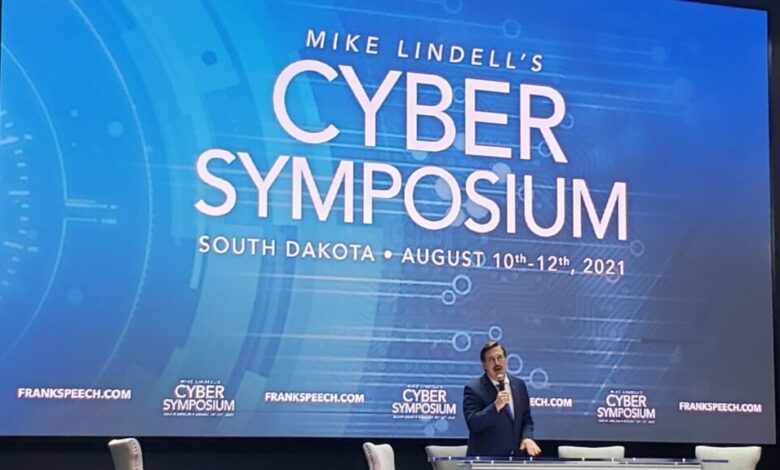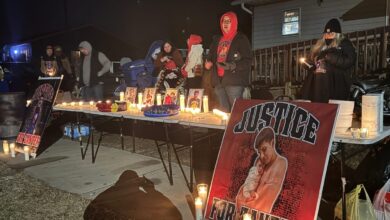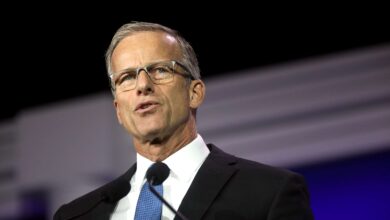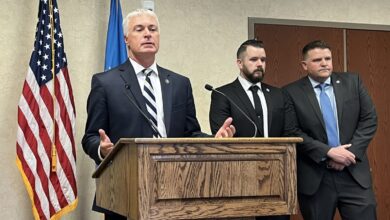The cyber expert who took Mike Lindell’s $5 million challenge in Sioux Falls and won

At first, Bob Zeidman was reluctant to take Mike Lindell up on his $5 million challenge to anyone who could disprove his claim that the 2020 election was stolen.
In 2021, Lindell held a “cyber symposium” in Sioux Falls, where he vowed to unveil proof that China had interfered in the election.
Zeidman is a cyber forensics expert who has programmed computers for about 50 years, was a pioneer in the field of software forensics and founded several successful Silicon Valley firms. He voted for Donald Trump in 2020 — even though he says he doesn’t like him — and respected Lindell for having gone from coke addict to born-again pillow mogul.
At his friends’ urging, Zeidman decided to fly to South Dakota, figuring it would be historical one way or the other.
“I went in with an open mind,” he said. “I was hoping Mike Lindell was right.”
Zeidman ended up proving Lindell wrong, according to an arbitration panel that ruled in his favor in April.
We talked to Zeidman about the experience, which he wrote about in a recently published book called “Election Hacks.”
This interview was edited for length and clarity.
What did you think of Lindell before you embarked on this whole thing?
I knew a little bit about him and I had a lot of respect for him. I knew he was a recovered cocaine addict and alcoholic, a guy who turned his life around, found Christianity, which I think is great. I’m not a Christian myself, I’m Jewish, but I’ve found over the years I really respect people who are devoted to religion. And he started a successful business. So I admired that.
What did you think of his election claims before you looked at the data?
I was confused. I didn’t know why he would be the one to have this data but he said he hired a crack team of analysts who found that this showed hacking. So I assumed that he had hired people who were experts in their field or at least alleged experts in their field, and one of two things: either they actually did find find fraud, and I’d be really interested to see the results … or they had done an incorrect analysis in which case I might figure that out. I was just going to see how it played out.
But I didn’t have any idea that the people who worked on this were totally unqualified to do this and really they were finding polling results out of thin air. There was zero analysis. Basically, everybody accepted at face value what Lindell had when Lindell got this data from a known con artist.
(Editor’s note: Federal judges have also accused Dennis Montgomery of fraud and cited him for perjury.)
Did you get a sense whether Lindell has much knowledge in this field?
He admitted over and over again at the deposition and hearing that he didn’t understand the technology, but having said that, he defended it vigorously. He would get upset, and this is terrible at a hearing. I’ve done enough of these to know you don’t wanna get overly emotional and confrontational, but he just couldn’t help himself.
He does sometimes contradict himself.
He was great for our side because he just couldn’t control himself from saying things like that, contradicting himself, making statements that he would admit he didn’t know but he was sure they were true.
Did anyone else at the symposium come close to what you did?
I would say every single person there agreed with me. But here’s the difference: I was the first one to recognize what the data was. Everyone said this doesn’t appear to be legitimate data, but they were divided. Some of them said, “Let’s keep looking at it, let’s keep looking at it. Maybe it’s legitimate.”
And others said it’s not legitimate but let’s give Lindell another chance; let’s approach him and say the data is not right but maybe you haven’t given us the right data. Which is pretty ridiculous.
This was a $5 million prize and he accidentally pulled out the wrong data?
I voted for Trump. I don’t like Trump but I voted for him … but when I go into any kind of examination I leave that all behind … because I’ll find the truth. So I went into this with an open mind. I was hoping Lindell was right, actually.
I thought if this showed the election was hacked, this would be historical information and I would be part of it. And I thought, how cool would that be? So I went in with an open mind but as soon as I found the data was bogus, I wasn’t going to give Lindell more and more chances.
We all agreed it was bogus data but I was the first one to figure out what it was exactly. And I was the only one to write a detailed report and submit it to Lindell. And no one in their right mind would offer $5 million if the data wasn’t real and verified, right?
So how would you explain to the layperson what you deduced?
The main thing I found was I just recognized that there were transformations that were done on this data. One of the things I pride myself on is pattern recognition. Sometimes I’ve wondered — people call me a genius; they tell me I’m really, really smart. I won’t dispute that, but sometimes I wonder if my biggest ability is just pattern matching. I can see patterns that other people don’t see and when I looked at this data, I immediately saw a pattern — this looked like another kind of data. Like if you saw hieroglyphics and said, “Oh, I know what each word is, I can write it in English.” You’re not changing it, you’re just translating it. Or if you see French and you translate it to English.
When I did these two translations, I realized what I had was a Word document. And then I called it up in Word, and sure enough, it was just a Word document perfectly formatted with gibberish in it.
His proof was just gibberish?
Well there was a giant file he gave us. I ran every tool, including my own tool, and every tool said this is nothing, just random stuff. My report said this is nothing that any known tool could analyze, so it’s not real data. But it was 23 gigabytes of ones and zeroes.
What’s interesting is that Lindell’s people said, “If Zeidman had the right tools, he would translate it into this spreadsheet,” which Lindell had also given us. Anyone could see the spreadsheet was not any election data. It was just a spreadsheet of stuff like polling locations and the names of Trump and Biden and latitudes and longitudes.
So this giant 23-gigabyte file that I analyzed every way possible they claimed turned into this spreadsheet they had already given me that everyone could see was not election data.
So they missed this huge opportunity — if I were them and I wanted to cheat, I would say the election data is all in this 23-gigabyte file and Mr. Zeidman doesn’t know what it is. But instead the colossal mistake they made was to say, “Oh this 23-gigabyte file turns into this tiny little spreadsheet.”
And so at that point I said, well the spreadsheet is bogus — everyone can see it’s bogus so we don’t even have to look at the 23-gigabyte file. If they wanted to cheat, they should have said, “Oh he doesn’t know what the 23-gigabyte file is, therefore he didn’t prove anything.” That’s what my biggest fear was.
It turns out Dennis Montgomery — the guy who sold them the data — created a program that would take a tiny spreadsheet and turn it into a 23-gigabyte file of nonsense. It was a special program that he created to basically fill in garbage, but you could undo it.
Lindell’s experts said, “Well he was super-encrypting and compressing.” Well compressing makes something smaller, not 1,000 times larger. Why are you hiding evidence with all kinds of fancy encryption?
Would Mike have been in on that?
All of us at the conference were speculating on that. We really didn’t know if Lindell was in on it or not. That was a big question. We all agreed it was bogus data. My belief after going to the hearing is that Dennis Montgomery’s done this before — many many times, he gives bogus data.
He knows enough computer programming to write a program that’ll mix up the data to make it unrecognizable and he sells it to people who have no knowledge of technology so they can’t verify it.
And then another guy – Conan Hayes – Mike Lindell uses him to vet all the data he received from Dennis Montgomery. That came out in testimony. Conan Hayes is a surfer who started a surf shop called RVCA and he sold it for a lot of money to Billabong. I looked into this guy’s background and there’s nothing that says he even ever took a course in computers. You’ll find that all of the lawsuits around the country into voting machine hacking were funded by Lindell and vetted by Conan Hayes.
What do you think of the safety of election machines in America?
My take is that there can be problems. There can be bugs in the software … but I don’t think there was any hacking to turn the election one way or the other. I’m almost sure there was no purposeful effort by the voting machine company to change the election.
Any kind of tampering with the election results in the machine itself is going to be found by people like me, and there’s a lot of people like me. Because there will be evidence if it was hacked and it will become clear eventually.
I’ve argued that I believe there was fraud in the 2020 election and the reason for that is there’s fraud in every human endeavor. Whether or not it was enough to change the election results, I don’t know. But what I do know is that any problems with the voting machines would be found; there would be serious consequences for anyone doing that.
It’s like if your house has this complex electronic security system but you leave the back door open all the time. Nobody’s gonna hack into your electronic system. It’s really, really hard and expensive and you can get caught. They’ll just walk in the back door.
There’s so many ways of cheating in an election that don’t have to do with hacking into voting machines — why would anyone hack into a voting machine?
Have you gotten any of the $5 million?
I’m a pessimist in general. I don’t think I’ll see it. I do think he’s gonna go bankrupt from all the lawsuits and all his expenditures on these illegitimate voting fraud cases. So I think he’ll delay things until he’s out of money, and I probably won’t see anything.
I never really expected $5 million. I certainly really wish I had it. I could put at least some of it towards voter integrity.
You’ve said you would donate it all to that sort of cause?
I would donate a good portion of it. There’s a lot of nonprofits that would be getting a portion of it




